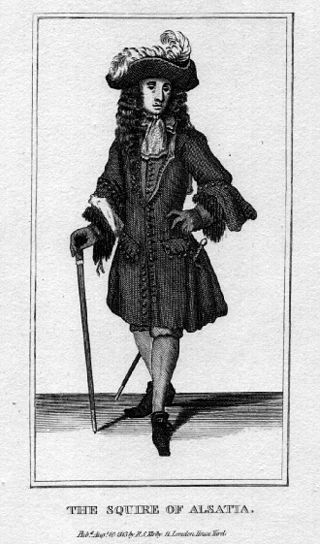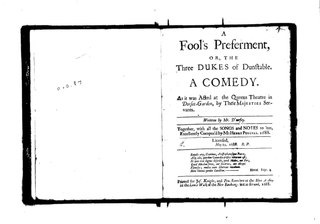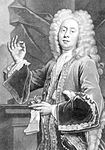Susanna Verbruggen, aka Susanna Mountfort, was an English actress working in London.

The Draughtsman's Contract is a 1982 British period comedy-drama film written and directed by Peter Greenaway – his first conventional feature film. Originally produced for Channel 4, the film is a form of murder mystery, set in rural Wiltshire, England in 1694. The period setting is reflected in Michael Nyman's score, which borrows widely from Henry Purcell, and in the extensive and elaborate costume designs. The action was shot on location in the house and formal gardens of Groombridge Place. The film received the Grand Prix of the Belgian Film Critics Association.
John Baptista Verbruggen, d. 1708, was an English actor working in London. Verbruggen is first mentioned as a member of the United Company in a Lord Chamberlain's warrant in 1688. His name does not appear in any cast lists until October 1690. The Biographical Dictionary of Actors contains an inconclusive discussion of the statement in Thomas Davies's Dramatic Miscellanies (1784) that Verbruggen was identical to the actor referred to in 1680s and 90s cast lists as "Mr. Alexander", supposedly an alias based on the part of Alexander the Great in John Dryden's Rival Queens. The evidence is confusing, and there is no independent support for Davies's anecdote, written down a century later. Verbruggen had never played the part of Alexander the Great and was not to do so until January 1703.

The Fairy-Queen is a semi-opera by Henry Purcell; a "Restoration spectacular". The libretto is an anonymous adaptation of William Shakespeare's comedy A Midsummer Night's Dream. First performed in 1692, The Fairy-Queen was composed three years before Purcell's death at the age of 35. Following his death, the score was lost and only rediscovered early in the twentieth century.
The terms "semi-opera", "dramatic[k] opera" and "English opera" were all applied to Restoration entertainments that combined spoken plays with masque-like episodes employing singing and dancing characters. They usually included machines in the manner of the restoration spectacular. The first examples were the Shakespeare adaptations produced by Thomas Betterton with music by Matthew Locke. After Locke's death, a second flowering produced the semi-operas of Henry Purcell, notably King Arthur and The Fairy-Queen. Semi-opera received a deathblow when the Lord Chamberlain separately licensed plays without music and the new Italian opera.

The Squire of Alsatia is a 1688 comedy play by the English writer Thomas Shadwell. Alsatia was a nickname for the Whitefriars area of London, deriving from Alsace in northeastern France. A restoration comedy, it was performed at the Drury Lane Theatre by the United Company following John Crowne's Darius, King of Persia. One of the best-remembered roles, that of the shrewish Mrs. Termagant was first performed by Elizabeth Boutell. The play was revived numerous times during the eighteenth century.

"Remember not, Lord, our offences", Z.50, is a five-part choral anthem by the English baroque composer Henry Purcell (1659–95). The anthem is a setting of a passage from the litany compiled by Thomas Cranmer, Archbishop of Canterbury, and later included in the Anglican Book of Common Prayer. It was composed circa 1679–82 at the beginning of Purcell's tenure as Organist and Master of the Choristers for Westminster Abbey.

Man Hunt is a 1936 American comedy film directed by William Clemens and written by Roy Chanslor. The film stars Ricardo Cortez, Marguerite Churchill, Charles "Chic" Sale, William Gargan, Dick Purcell and Olin Howland. The film was released by Warner Bros. on February 15, 1936.
The Younger Brother, or, The Amorous Jilt is a comedy written by Aphra Behn. The play was first performed and published posthumously in 1696, but was probably written in the late 1680s.
The Rival Sisters: or, The Violence of Love is a 1695 tragedy by the English writer Robert Gould. Gould's previous attempt to have a tragedy Innocence Distress'd staged by the United Company was blocked and by the time his second work was performed he had given up writing.

The Volunteers is a 1692 comedy play by the English writer Thomas Shadwell. Shadwell completed the play shortly before his death and it was performed posthumously at the Drury Lane Theatre by the United Company. It is also known by the long title The Volunteers; or, The Stock-Jobbers.
The Richmond Heiress is a 1693 comedy play by the English writer Thomas D'Urfey.

The Married Beau or The Curious Impertinent is a 1694 comedy play by the English writer John Crowne. It is inspired by a passage from Miguel de Cervantes's Don Quixote. Incidental music was composed by Henry Purcell.
The Fatal Marriage; Or, The Innocent Adultery is a 1694 tragicomedy by the Anglo-Irish writer Thomas Southerne. It was part of the tradition of She-tragedy which flourished at the time. Incidental music for the work was composed by Henry Purcell.
The Maid's Last Prayer: Or, Any Rather Than Fail is a 1693 comedy play by the Irish writer Thomas Southerne. It was first staged at the Theatre Royal, Drury Lane by the United Company.
The Massacre of Paris is a 1689 tragedy by the English writer Nathaniel Lee. It was first staged by the United Company at the Theatre Royal, Drury Lane. It is based around the 1572 St. Bartholomew's Day massacre which led the killing of many Huguenots during the French Wars of Religion. The events had previously been portrayed in Christopher Marlowe's Elizabethan play The Massacre at Paris.

Love Triumphant; Or, Nature Will Prevail is a 1694 tragicomedy by the English writer John Dryden. It was Dryden's final stage play.

A Fool's Preferment; Or, The Three Dukes Of Dunstable is a 1688 comedy play by the English writer Thomas D'Urfey. It is a reworking of John Fletcher's Jacobean work The Noble Gentleman. It was first performed by the United Company at the Dorset Garden Theatre in London. Henry Purcell composed the play's incidental music. It was his first major work composing for the theatre in seven years since Sir Barnaby Whigg.
Distress'd Innocence; Or, The Princess Of Persia is a 1690 tragedy by the English writer Elkanah Settle. It was first performed by the United Company at the Theatre Royal, Drury Lane in London. Incidental music was composed for the play by Henry Purcell.










